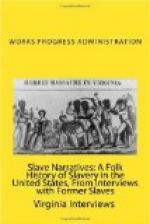“Den he say to me,
‘From now on you works in de fiel’. I aint gwine a-have no vicious boy lak you ‘roun de lady folks.’ I was too little for fiel’ work, but de nex’ mornin’ I went to choppin’ cotton. After dat I made a reg’lar fiel’ han’. When I growed up I was a ploughman. I could sho’ lay off a pretty cotton row, too.
“Us slaves was fed good plain grub. ‘Fore us went to de fiel’ us had a big breakfas’ o’ hot bread, ’lasses, fried salt meat dipped in corn meal, an’ fried taters[FN: sweet potatoes]. Sometimes us had fish an’ rabbit meat. When us was in de fiel’, two women ’ud come at dinner-time wid baskets filled wid hot pone, baked taters, corn roasted in de shucks, onion, fried squash, an’ b’iled pork. Sometimes dey brought buckets o’ cold buttermilk. It sho’ was good to a hongry man. At supper-time us had hoecake an’ cold vi’tals. Sometimes dey was sweetmilk an’ collards.
“Mos’ ever’ slave had his own little garden patch an’ was ’lowed to cook out of it.
“Mos’ ever plantation kep’ a man busy huntin’ an’ fishin’ all de time. (If dey shot a big buck, us had deer meat roasted on a spit.)
“On Sundays us always had meat pie or fish or fresh game an’ roasted taters an’ coffee. On Chris’mus de marster ‘ud give us chicken an’ barrels o’ apples an’ oranges. ‘Course, ever’ marster warnt as free handed as our’n was. (He was sho’ ’nough quality.) I’se hear’d dat a heap o’ cullud people never had nothin’ good t’eat.
“I warnt learnt nothin’ in no book. Don’t think I’d a-took to it, nowhow. Dey learnt de house servants to read. Us fiel’ han’s never knowed nothin’ ‘cept weather an’ dirt an’ to weigh cotton. Us was learnt to figger a little, but dat’s all.
“I reckon I was ‘bout fifteen when hones’ Abe Lincoln what called hisse’f a rail-splitter come here to talk wid us. He went all th’ough de country jus’ a-rantin’ an’ a-preachin’ ‘bout us bein’ his black brothers. De marster didn’ know nothin’ ’bout it, ’cause it was sorta secret-lak. It sho’ riled de Niggers up an’ lots of ’em run away. I sho’ hear’d him, but I didn’ pay ‘im no min’.
“When de war broke out dat old Yankee Dutch overseer o’ our’n went back up North, where he b’longed. Us was pow’ful glad an’ hoped he’d git his neck broke.
“After dat de Yankees come a-swoopin’ down on us. My own pappy took off wid ’em. He j’ined a comp’ny what fit[FN: fought] at Vicksburg. I was plenty big ‘nough to fight, but I didn’ hanker to tote no gun. I stayed on de plantation an’ put in a crop.
“It was pow’ful on easy times after dat. But what I care ’bout freedom? Folks what was free was in misery firs’ one way an’ den de other.
“I was on de plantation closer to town, den. It was called ’Fish Pond Plantation.’ De white folks come an’ tol’ us we mus’ burn all de cotton so de enemy couldn’ git it.
“Us piled it high in de fiel’s lak great mountains. It made my innards hurt to see fire ‘tached to somethin’ dat had cost us Niggers so much labor an’ hones’ sweat. If I could a-hid some o’ it in de barn I’d a-done it, but de boss searched ever’where.




